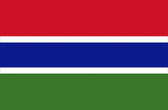
Call 0330 880 3600 Calls may be monitored or recorded. Opening Times.
- TRAVEL INSURANCE
- COVID-19 COVER
- More Options
- Help & Advice
- Existing Customers

Call 0330 880 3600 Calls may be monitored or recorded. Opening Times.

Need help?
UK Customer Services0330 880 3600*
Open Monday to Friday 9:00am to 6pm, Saturday 8:30am to 4pm and closed Sundays.
*Calls are recorded for training and quality purposes.

Official name: Republic of the Gambia
Capital city: Banjul
Official language: English
Population: Around 2.8 million
Currency: Gambian dalasi (GMD)
Time zone: GMT (no daylight savings)
Driving side: Right
Climate: Tropical, with a hot rainy season from June to October and a cooler dry season from November to May
The Gambia, Africa’s smallest mainland nation, is a narrow strip of land surrounding the River Gambia and opening into the Atlantic Ocean. Known for its warm hospitality and laid-back atmosphere, the country attracts visitors with golden beaches, wildlife-rich mangroves, and lively markets. Tourism is centred along the Atlantic coast, while upriver regions reveal more traditional village life and birdwatching opportunities.
The Gambia stretches roughly 480 kilometres inland but is only 50 kilometres wide at most. The River Gambia dominates the landscape, flowing east to west before reaching the Atlantic. Much of the country is flat, with savannah, mangrove swamps, and small patches of woodland. Its coastal climate supports lush greenery in the wet season and drier conditions inland. Wildlife includes monkeys, crocodiles, hippos, and a wide variety of bird species.
Banjul International Airport is the main entry point, with seasonal direct flights from the UK and Europe. Taxis and private transfers are common for getting to coastal resorts, while buses and shared taxis provide local transport inland. Roads can be poor away from main routes, and river crossings are often by ferry. The Gambia is a compact country, so journeys rarely take more than a few hours.
UK citizens need a visa to enter The Gambia. Tourist visas are typically valid for up to 28 days and can be extended locally. Passports must be valid for at least six months beyond your stay. The British High Commission in Banjul provides consular support. Always check the latest requirements before travel, as entry rules may change at short notice.
The Gambian dalasi (GMD) is the local currency. ATMs are available in larger towns, though they can be unreliable. Cash is the main form of payment, and US dollars, euros, and pounds sterling are often accepted in tourist areas. Credit cards are accepted only in major hotels and some restaurants, with surcharges common. Bargaining is part of everyday life in markets.
Medical facilities in The Gambia are limited, particularly outside Banjul. Basic healthcare is available in urban centres, but serious conditions may require evacuation to Europe. Travellers should ensure they have comprehensive medical insurance, including cover for air evacuation. Malaria is a risk year-round, and preventive medication is recommended. Vaccinations for hepatitis A, typhoid, and yellow fever are also advised. Bottled or purified water should be used, and insect protection is essential.